Time was John Ford stood
in for the entire American Cinema. Sergei Eisenstein, Fritz Lang, René
Clair and John Ford, and you were sweet. The rest was national local
consumption or mere commercial product. It was a simpler era but vapors
of sanctity still swirl about the great man. I must admit that my own
admiration was second to none and was boosted as the films of the early
thirties escaped the vaults.
However, though he’s on the way to being the most documented figure in film, the John Ford cult sweeps a lot of his work under the mat, his military moral boosters which include a sex hygiene movie, his silent cowboy two-reelers and his stumbling first ventures in sound.
This
was obviously an A feature with a decent budget and using the Fox
company’s best personnel. At this stage it’s hard to tell whether they
were Fox people or Ford regulars. Jack Penneck and Ward Bond show up
briefly as noncom. Doughboys.
The plot reads like a first draft of next year’s much better John Cromwell film The Mighty
- gangster is drafted and, after distinguished service comes back home
to sort out the mob. Dudley Nichols, who would become Hollywood’s most
respected writer, largely through his collaboration with Ford, is
responsible.
The opening is a
good clue, with a striking silhouette shot of a team of safe breakers at
work, framed by stilted dialogue and filming in a cramped studio street
setting. The background noise comes & goes on edits.
The bulls arrive for star Edmund Lowe and, at headquarters, it looks as if the gang will be sent up the river until reporter (again) Lee Tracy suggests the mayor can win votes by having the members join up. “You let these guys go to France and the whole East Side will be proud of you.”
Ed pals with fresh faced Frank Albertson with an eye on his sister Catharine Dale Owen but she’s got Randolph Scott lined up, in possibly his first speaking part. His couple of scenes are filmed to favor the other players but he comes across effectively as a well-spoken and dignified disposable consort.
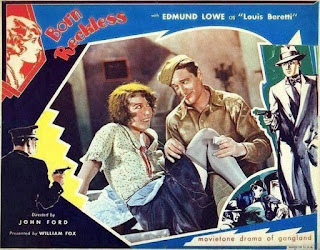 |
| D'Avril & Lowe |
There our hero is torn between his old loyalties to Big Shot Waren Hymer and the gang and his clean record new start. A "Two Years Later" title dissolves to the awning with Ed’s name and he’s running an up market night club. However the mob kidnaps Dale Owen’s baby and outraged Ed goes into action rescuing the kid and facing off the low-lifes. He and Hymer stand hands in the pockets of their overcoats - exchange of shots in the dark, (briefer than The Mighty but quite effective) and Ed staggers on like Jimmy Cagney in The Public Enemy or Jean Servais in Rififi.
| Hymer & Loew |
The shadow of Sunrise can still be seen with shooting on that film's
swamp set and the occasional piece of Germanic lighting, as in the
robbery and gunman shadow falling across the bar’s center opening doors
but these fail to redeem the general clumsiness. Still it’s better than
Ford’s The Black Watch and his next film Up the River would be quite presentable. Our man was on a steep learning curve.
I see Ford's recently uncovered 1918 Hell Bent as altogether more rewarding. It's his number five feature as director and is full of things that we will find in his mature work.
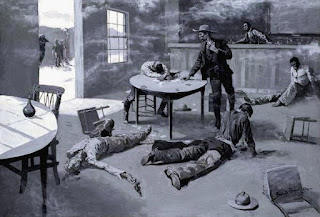 |
| Remington |
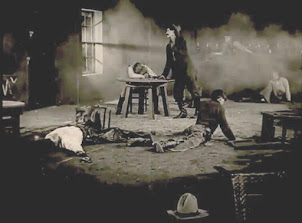 |
| Ford |
We
kick off with Cheyenne Harry Carey, presumably fresh from the incidents
in the painting, producing the cards concealed all over him, on the run
from a posse blazing away till he’s safe across the river in Gil
county. Arriving in Rawhide Town he rides his horse onto the The Last
Bet Saloon and Dance Hall floor and demands a room only to be told
all the beds already have three men in them, except for the one occupied
by Cimmaron Bill / Lee who won’t share, so Harry rides on into his
room, where Harry’s horse munches on the hay in the mattress while its
rider ejects the tenant out the window at gunpoint, into the muck heap
below. Lee comes back and it’s Harry out the window but, before they
shoot it out, they discover a mutual enthusiasm for song and buddy up.
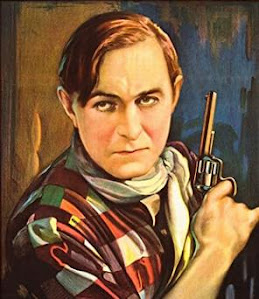 |
| Harry Carey |
The
gang is holed up in familiar locale, Beale’s Cut Newall County (the one
they run the stage coach race through in the Tom Mix The Last Trail)
where Harry sets out to rescue the girl and he and Harris end up taking
rounds in a shoot-out in the desert (“you’ll cook with me”) leaving the
one horse for Gerber to escape. Harris doesn’t survive the dust storm
but Harry is rescued by Lee and his Indian guide and presumably lives
happily ever after.
This one is not just a start point for the development of John Ford but in itself a lively depiction of frontier life, with cheated card games, rough saloons, stage bandits, pelting rain storms and the Pony Express rider racing through the main street with a delivery. Add a struggle through the desert that anticipates Greed. The cast inhabit their stock characters effectively.
There are two copies on You Tube, an un-restored print up of an original tinted Czech copy with an awful organ score or a cleaned up B&W that runs too fast. You choose.
Barrie Pattison 2023
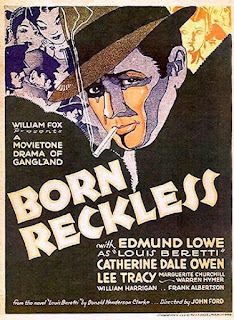
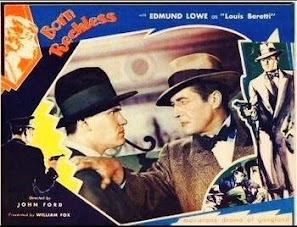
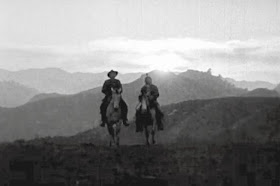
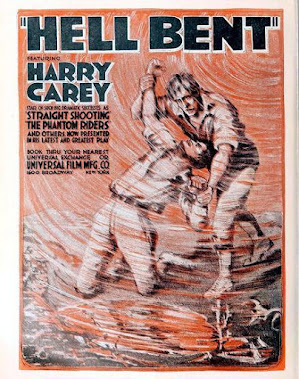
No comments:
Post a Comment